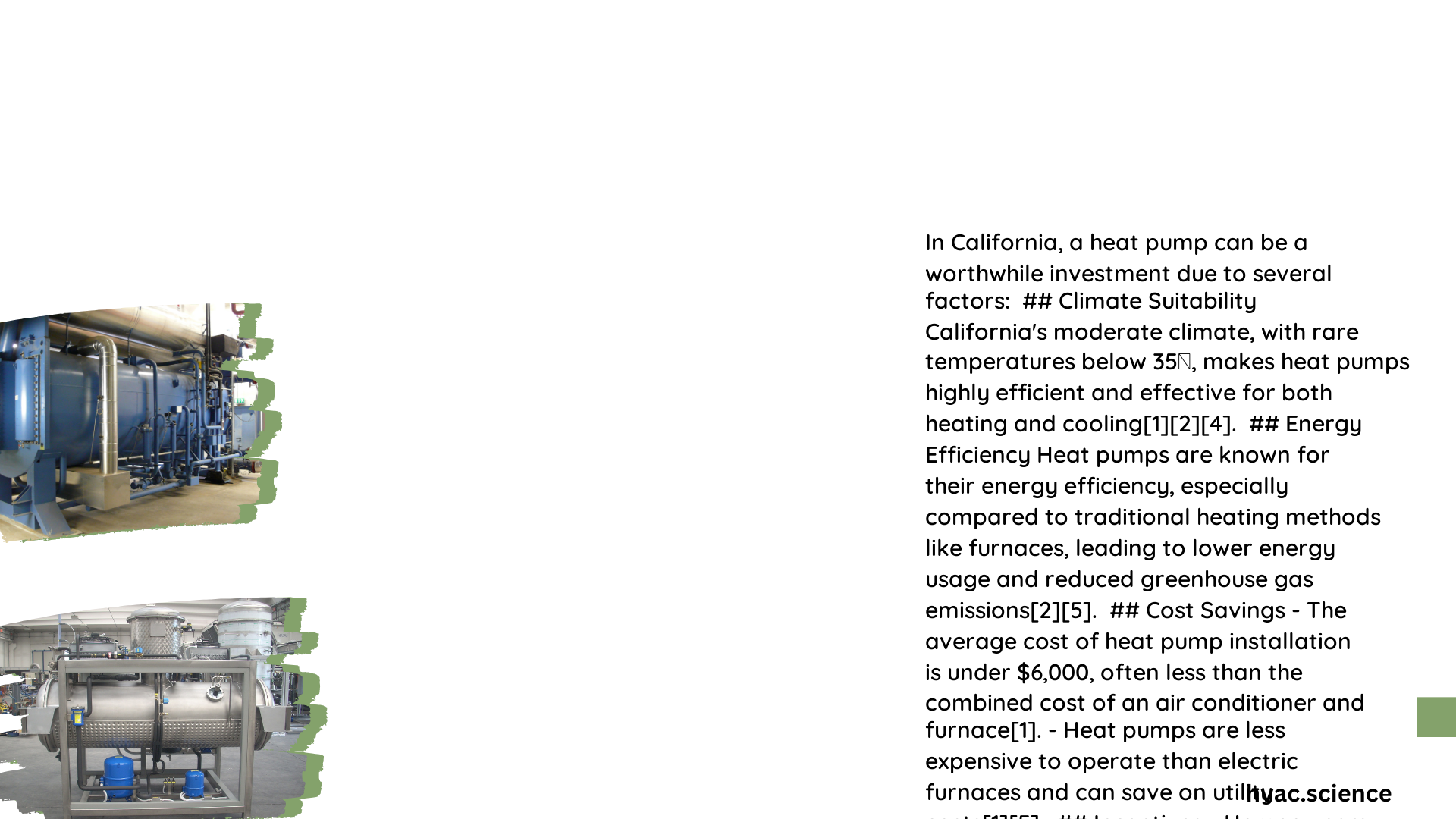California homeowners face a critical decision about home heating and cooling systems. Heat pumps offer an innovative solution that promises significant energy savings, reduced carbon footprint, and substantial financial incentives. With state-specific rebates, federal tax credits, and exceptional performance in California’s mild climate, heat pumps represent a compelling investment for environmentally conscious and cost-aware residents seeking efficient home comfort solutions.
Is a Heat Pump Worth It in California? Comprehensive Analysis
What Makes Heat Pumps Attractive in California?
Heat pumps have emerged as a game-changing technology for California homeowners, offering multiple advantages that make them an increasingly attractive option. The state’s unique climate, progressive energy policies, and robust financial incentives create an ideal environment for heat pump adoption.
Cost-Effectiveness of Heat Pump Investment
| Metric | Value | Impact |
|---|---|---|
| Annual Energy Savings | $300 – $500 | Significant Reduction in Utility Bills |
| Federal Tax Credit | Up to 30% | Reduces Initial Installation Cost |
| State Rebates | Up to $8,000 | Substantial Financial Incentive |
| Typical ROI Timeline | 5-7 Years | Quick Payback Period |
How Much Can You Save with a Heat Pump?
Heat pumps in California offer remarkable energy efficiency, particularly in regions with moderate temperatures. Homeowners can expect substantial savings through:
- Reduced Electricity Consumption: Up to 75% lower compared to traditional electric resistance heating
- Lower Monthly Energy Bills: Consistent savings throughout the year
- Dual Functionality: Heating and cooling in a single system
What Incentives Are Available for California Residents?
California provides an impressive array of financial incentives to encourage heat pump adoption:
- Federal Incentives:
- 30% tax credit (maximum $2,000)
-
Applies to heat pump HVAC system installations
-
State Programs:
- TECH Clean California rebates
- Home Electrification and Appliance Rebates (HEEHRA)
-
Income-qualified homeowners eligible for up to $8,000 in rebates
-
Local Utility Incentives:
- Los Angeles DWP: $100 per ton rebate
- SMUD: Up to $3,000 for heat pump replacement
- Roseville Electric: $350 for ductless mini-split installation
Are Heat Pumps Efficient in California’s Climate?
California’s diverse climate makes heat pumps particularly effective:
- Coastal Regions: Peak efficiency due to moderate temperatures
- Inland Areas: Advanced technology ensures consistent performance
- High Efficiency Ratings:
- SEER ratings: 18-22
- HSPF ratings: 8-10
What Maintenance Do Heat Pumps Require?
Proper maintenance ensures optimal performance and longevity:
- Annual Service Cost: $100 – $300
- Recommended Maintenance:
- Annual professional inspection
- Regular filter cleaning
- System performance check
Who Should Consider a Heat Pump?
Ideal candidates include:
– Homeowners seeking energy-efficient solutions
– Those looking to reduce carbon footprint
– Residents in moderate climate zones
– Individuals eligible for state and federal incentives
Potential Limitations to Consider
While heat pumps offer numerous benefits, potential drawbacks include:
– Higher upfront installation costs
– Performance challenges in extreme temperature regions
– Potential need for supplemental heating in very cold areas
Final Recommendation
For most California homeowners, heat pumps represent an excellent investment. The combination of financial incentives, energy efficiency, and environmental benefits makes them a compelling choice for home comfort and sustainability.
Actionable Next Steps
- Research local utility incentives
- Get professional energy assessment
- Compare heat pump models
- Calculate potential savings
- Apply for available rebates
References:
1. TECH Clean California
2. California Energy Commission
3. DSIRE Incentives Database
4. Energy Star Heat Pump Guide
5. California Public Utilities Commission

